Overview
- Description
- The Peter and Berta Victor papers consist of an autograph book, biographical materials, correspondence, printed materials, restitution files, and writings documenting Peter and Berta Victor, their families, and their lives in Berlin, Vienna, Shanghai, and the United States.
The autograph book belonged to Peter Victor and contains a handful of entries from friends and family members.
Biographical materials consist of family trees; identification papers; birth, marriage, and death certificates; affidavits; employment records; and letters of recommendation documenting Peter and Berta Victor, Peter’s relatives, their pre-war lives in Germany and Austria, Peter’s time in Shanghai, and their immigration to the United States.
Correspondence includes postcards and letters between Peter and Berta Victor and their family members and friends in Germany, Shanghai, and America during and after the war. The correspondence documents family news and emigration plans.
Photographs depict Peter Victor and his family and friends in Germany, Shanghai, and America.
Printed materials include two American Red Cross First Aid textbooks, a book about Japanese prints, a Berlin map and brochure, clippings about the Holocaust, and picture postcards depicting scenes in Hawaii, Sacramento, Paris, and Colorado.
Restitution files consist of correspondence, affidavits, and forms documenting Peter Victor’s efforts to receive restitution for his family’s lost property, the interruption of his education, the cost of his passage to Shanghai, and the death of his parents in Shanghai.
Writings include poems by Carl and Peter Victor as well as a sales description of a meat processing practice and instructions for serving a Viennese dinner. - Date
-
inclusive:
circa 1900-1991
- Credit Line
- United States Holocaust Memorial Museum Collection, Gift of Peter Victor
United States Holocaust Memorial Museum Collection, Gift of Peter M. Victor, in memory of Carl and Elsa Victor and Berta Neidermann Victor
United States Holocaust Memorial Museum Collection, Gift of Peter M. Victor
United States Holocaust Memorial Museum Collection, Gift of the Estate of Peter M. Victor
United States Holocaust Memorial Museum Collection, Gift of the Estate of Peter M. Victor and in memory of Carl and Elsa Victor and Berta Neidermann Victor - Collection Creator
- Peter M. Victor
Berta Victor - Biography
-
Peter Max Victor was born in Munich, Germany, on April 19, 1920, the only child of Carl Nathan and Elsa Alexander Victor. Carl was born in Gusten on May 1, 1879, to Louis (1832-1901) and Henrietta Pels Victor (1850-1940). Carl had a sister, Rebecca (1881-1970) who married a gentile, Gustav Adler (1882-1958), and had two sons. Elsa was born on December 25, 1888. Carl served in the Germany Army during World War I (1914-1918.) Carl was a poet and chemist and owner of a food dye and preservatives factory. Elsa worked with the business. In 1924, the family moved to Berlin. The family was well off and Jewish, but not especially observant. After the establishment of the Nazi dictatorship in Germany in 1933, anti-Jewish legislation and restrictions became increasingly harsh. Carl’s business was not restricted and it converted to produce war rations for the Army. After the Kristallnacht destruction of November 9-10, 1938, the family decided to leave Germany. They bought tickets for Shanghai, China, because it was an open port with no visa requirements.
Peter left Germany on May 15, 1939, and arrived in Shanghai on June 14. Carl sold the family’s furniture and his factory. Jews could take almost no money out of Germany. Carl entrusted the sale proceeds to a friend who said he would transfer it to a bank in Shanghai, but never did. Carl and Elsa arrived in Shanghai in June 1939 on the Conte Rosso. They lived together in a small room, but life was difficult because they were penniless. Peter worked odd jobs in a hospital and community kitchen. Both of his parents contracted tropical diseases. Carl died, 61, of amoebic dysentery on November 29, 1940. Elsa developed diabetes because of the lack of adequate food and, at age, 54, passed away on May 9, 1942. Peter had to move to Hongkew ghetto in 1943 and got a job as a lifeguard at Hongkew Park, a country club for the elite of the Japanese occupation authorities.
The war in Europe ended with Germany's surrender on May 7, 1945. Shanghai was liberated by the United States Army on September 3, 1945. Peter worked as a dispatcher and driver for the US Army Air Force motor pool. In December 1947, the American Joint Distribution Committee assisted Peter in emigrating to America on the USNS Marine Adder. His paternal aunt, Rebecca Adler, survived the war in Berlin; her husband, who was not Jewish, had been able to save her, but both their sons were killed by the Nazis. For two years, he lived in San Francisco. Peter married Berta Neidermann Spiner on April 25, 1951, in Chicago. Berta, born January 20, 1917, had arrived in the US in 1938, a refugee from Nazi ruled Vienna. Her parents, Joseph and Anna Scheier Neidermann, were murdered in Auschwitz. Peter and Berta settled in Washington DC. Peter owned a gift business. After his retirement, he volunteered at the United States Holocaust Memorial Museum. Berta, 71, passed away on May 28, 1988. Peter, 73, died on May 7, 1993.
Berta Neidermann was born on January 20, 1917, in Vienna, Austria, to Jewish parents, Josef and Anna Scheier Neidermann. Josef was born on October 10, 1886, in Gallatz, Austro-Hungary. Anna was born in August 1894 in Bania. In March 1938, Nazi Germany marched into Vienna and annexed Austria. Anti-Jewish laws were passed to disenfranchise and persecute the Jewish population. Berta emigrated to the US from Cherbourg, France, aboard the Columbus, arriving on December 3, 1938. Her sister Helene Bermann (1918-1993) sailed from Cherbourg on the SS Bremen, arriving on May 25, 1939. Both sisters settled in Chicago. Her parents Josef and Anna fled to Brussels, Belgium, in March 1939. Their younger brother Ulrich (1926-1985?) was sent to England. His name was changed to John Carlisle. He served in the British Army during the war. Berta's youngest sister Melanie (1921-1971) also left Vienna for France, and then escaped to Spain.
The war ended in May 1945. Berta's parents had been detained in Malines (Mechelen) transit camp in Belgium, deported to Auschwitz concentration camp on October 31, 1942, and presumably killed. Berta's sister Melanie, with her young son, arrived in the US in 1946. Their brother, with his wife Doreen, moved to the US in 1952. While in Chicago, Berta met Peter Victor, a German Jewish refugee. Peter and his family left Berlin in 1939 for Shanghai, China. His parents Carl and Elsa died there and Peter emigrated to the US in 1947. The couple married on April 29, 1951, and settled in Washington DC. Berta, 71, passed away on May 28, 1988. Peter, 73, died on May 7, 1993.
Physical Details
- Genre/Form
- Photographs.
- Extent
-
2 boxes
1 oversize folder
- System of Arrangement
- The Peter and Berta Victor papers are arranged as seven series: I. Autograph book, 1934-1936, II. Biographical materials, 1906-1990s, III. Correspondence, 1927-1991, IV. Photographs, approximately 1900-1991, V. Printed materials, 1933-1968, VI. Restitution files, 1940-1990, VII. Writings, approximately 1926-1930s
Rights & Restrictions
- Conditions on Access
- There are no known restrictions on access to this material.
- Conditions on Use
- Material(s) in this collection may be protected by copyright and/or related rights. You do not require further permission from the Museum to use this material. The user is solely responsible for making a determination as to if and how the material may be used.
Keywords & Subjects
Administrative Notes
- Holder of Originals
-
United States Holocaust Memorial Museum
- Legal Status
- Permanent Collection
- Provenance
- Peter Victor donated the Peter and Berta Victor papers to the United States Holocaust Memorial Museum in 1990, 1992, 1994, and 2004. Accessions previously cataloged as 1990.277, 1992.A.0112, 1994.A.0076, and 2004.524.1 have been incorporated into this collection.
- Funding Note
- The cataloging of this collection has been supported by a grant from the Conference on Jewish Material Claims Against Germany.
- Primary Number
- 1990.114.74
- Record last modified:
- 2023-03-30 15:19:50
- This page:
- https://collections.ushmm.org/search/catalog/irn85075
Additional Resources
Download & Licensing
In-Person Research
- Available for Research
- Plan a Research Visit
-
Request in Shapell Center Reading Room
Bowie, MD
Contact Us
Also in Peter Victor family collection
The collection consists of artifacts, currency, documents, photographs, and publications relating to the experiences of Carl, Elsa, and Peter Victor in prewar Berlin, Germany, during World War II in Shanghai, China, where Carl and Elsa Victor passed away, and then to Peter after the war in Shanghai and following his emigration to the United States in 1947.
Date: approximately 1900-approximately 1991
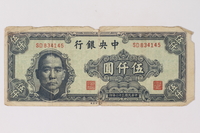
Central Bank of China, 5000 yuan note, acquired by a German Jewish refugee
Object
5000 yuan note issued by the Central Bank of China acquired by Peter Victor when he lived as a refugee in Shanghai, China, from 1938-1947. It features the portrait of Dr. Sun Yat-sen, founder of the Republic of China, who promoted the establishment of a national banking system. It was the primary issuer of bank notes in China from 1928-1942. It moved to Taiwan in 1949 and is now known as the Central Bank of the Republic of China (Taiwan). Peter, 18, left Berlin for Shanghai in 1938 to escape the anti-Jewish policies of the Nazi-led government. His parents, Carl and Elsa, arrived in Shanghai in 1939. Carl died in 1940 and Elsa in 1942. Shanghai was liberated by the United States Army on September 3, 1945. With the aid of the American Joint Distribution Committee, Peter emigrated to America in December 1947.
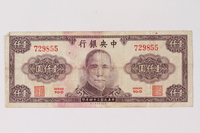
Central Bank of China, 1000 yuan note, acquired by a German Jewish refugee
Object
5000 yuan note issued by the Central Bank of China acquired by Peter Victor when he lived as a refugee in Shanghai, China, from 1938-1947. It features the portrait of Dr. Sun Yat-sen, founder of the Republic of China, who promoted the establishment of a national banking system. It was the primary issuer of bank notes in China from 1928-1942. It moved to Taiwan in 1949 and is now known as the Central Bank of the Republic of China (Taiwan). Peter, 18, left Berlin for Shanghai in 1938 to escape the anti-Jewish policies of the Nazi-led government. His parents, Carl and Elsa, arrived in Shanghai in 1939. Carl died in 1940 and Elsa in 1942. Shanghai was liberated by the United States Army on September 3, 1945. With the aid of the American Joint Distribution Committee, Peter emigrated to America in December 1947.

Central Bank of China, 1000 yuan note, acquired by a German Jewish refugee
Object
5000 yuan note issued by the Central Bank of China acquired by Peter Victor when he lived as a refugee in Shanghai, China, from 1938-1947. It features the portrait of Dr. Sun Yat-sen, founder of the Republic of China, who promoted the establishment of a national banking system. It was the primary issuer of bank notes in China from 1928-1942. This bank moved to Taiwan in 1949 and is now known as the Central Bank of the Republic of China (Taiwan). Peter, 18, left Berlin for Shanghai in 1938 to escape the anti-Jewish policies of the Nazi-led government. His parents, Carl and Elsa, arrived in Shanghai in 1939. Carl died in 1940 and Elsa in 1942. Shanghai was liberated by the United States Army on September 3, 1945. With the aid of the American Joint Distribution Committee, Peter emigrated to America in December 1947.
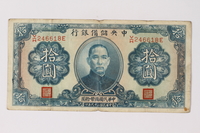
Central Reserve Bank of China, 10 yuan note, acquired by a German Jewish refugee
Object
10 yuan note, occupation currency issued by the Central Reserve Bank of China acquired by Peter Victor when he lived as a refugee in Shanghai, China, from 1938-1947. This was the bank set up by the pupper government installed by the Japanese in Nanjing in 1941, also known as the State Bank of the Republic of China government in Nanjing. This emergency currency was issued to deal with the high inflation rates caused by the war. Peter, 18, left Berlin for Shanghai in 1938 to escape the anti-Jewish policies of the Nazi-led government. His parents, Carl and Elsa, arrived in Shanghai in 1939. Carl died in 1940 and Elsa in 1942. Shanghai was liberated by the United States Army on September 3, 1945. With the aid of the American Joint Distribution Committee, Peter emigrated to America in December 1947.
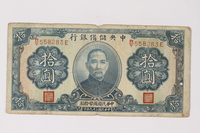
Central Reserve Bank of China, 10 yuan note, acquired by a German Jewish refugee
Object
10 yuan note, occupation currency issued by the Central Reserve Bank of China acquired by Peter Victor when he lived as a refugee in Shanghai, China, from 1938-1947. This was the bank set up by the puppet government installed by the Japanese in Nanjing in 1941, and also known as the State Bank of the Republic of China government in Nanjing. This emergency currency was issued to deal with the high inflation rates caused by the war. Peter, 18, left Berlin for Shanghai in 1938 to escape the anti-Jewish policies of the Nazi-led government. His parents, Carl and Elsa, arrived in Shanghai in 1939. Carl died in 1940 and Elsa in 1942. Shanghai was liberated by the United States Army on September 3, 1945. With the aid of the American Joint Distribution Committee, Peter emigrated to America in December 1947.
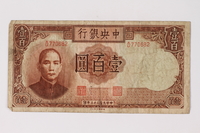
Central Bank of China, 100 yuan note, acquired by a German Jewish refugee
Object
100 yuan note issued by the Central Bank of China acquired by Peter Victor when he lived as a refugee in Shanghai, China, from 1938-1947. It features the portrait of Dr. Sun Yat-sen, founder of the Republic of China, who promoted the establishment of a national banking system. This bank is now known as the Central Bank of the Republic of China (Taiwan). Peter, 18, left Berlin for Shanghai in 1938 to escape the anti-Jewish policies of the Nazi-led government. His parents, Carl and Elsa, arrived in Shanghai in 1939. Carl died in 1940 and Elsa in 1942. Shanghai was liberated by the United States Army on September 3, 1945. With the aid of the American Joint Distribution Committee, Peter emigrated to America in December 1947.
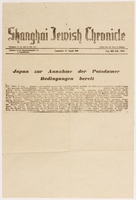
Shanghai Jewish Chronicle clipping
Document
Partially printed page containing one article. Front page from the Shanghai Jewish Chronicle, 1945, August 11. The headline reads "Japan to Accept Potsdam Demands."
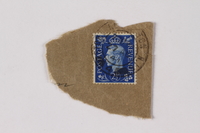
canceled British postage stamp acquired by a German Jewish refugee
Object
canceled British 2.5 shilling postage stamp acquired by Peter Victor when he lived as a refugee in Shanghai, China, from 1938-1947. Peter, 18, left Berlin for Shanghai in 1938 to escape the anti-Jewish policies of the Nazi-led government. His parents, Carl and Elsa, arrived in Shanghai in 1939. Carl died in 1940 and Elsa in 1942. Shanghai was liberated by the United States Army on September 3, 1945. With the aid of the American Joint Distribution Committee, Peter emigrated to America in December 1947.
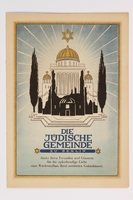
Souvenir booklet of 10 stamps for Berlin synagogues destroyed during Kristallnacht
Object
Souvenir booklet with a set of ten commemorative postage stamps depicting synagogues of Berlin destroyed during Kristallnacht, November 9-10, 1938. It was issued in Berlin in 1949, the Hebrew year 5710, to raise funds for restoration.
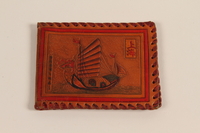
Laced leather billfold with a painted harbor owned by a German Jewish refugee
Object
Decorated leather billfold acquired by Peter Victor when he lived as a refugee in Shanghai, China, from 1938-1947. The name of his wife, Berta Manis Victor, is inscribed inside the wallet. They met in the United States after Peter's emigration from Shanghai in December 1947, and married in 1951. Berta left Germany for the US in 1938. Peter, age 18, left Berlin for Shanghai in 1938 to escape the anti-Jewish policies of the Nazi-led government. His parents, Carl and Elsa, arrived in Shanghai in 1939. Carl died in 1940 and Elsa in 1942. Shanghai was liberated by the United States Army on September 3, 1945. With the aid of the American Joint Distribution Committee, Peter emigrated to America in December 1947.
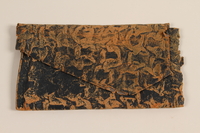
Blue leather clutch with a floral design used by a German Jewish refugee
Object
Dark blue leather clutch brought from Berlin that belonged to Peter Victor who lived as a refugee from Nazi Germany in Shanghai, China, from 1938-1947. Peter, age 18, left to escape the anti-Jewish policies of the Nazi-led government. His parents, Carl and Elsa, arrived in Shanghai in 1939. This purse may have originally belonged to his mother. Carl died in 1940 and Elsa in 1942. Shanghai was liberated by the United States Army on September 3, 1945. With the aid of the American Joint Distribution Committee, Peter emigrated to America in December 1947.
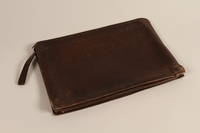
Brown leather briefcase brought by a German Jewish refugee
Object
Dark brown leather briefcase used by 18 year old Peter Victor in 1938 when he left Berlin, Germany, for Shanghai, China. Peter left to escape the anti-Jewish policies of the Nazi-led government. His parents, Carl and Elsa, arrived in Shanghai in 1939. Carl died in 1940 and Elsa in 1942. Shanghai was liberated by the United States Army on September 3, 1945. With the aid of the American Joint Distribution Committee, Peter emigrated to America in December 1947.
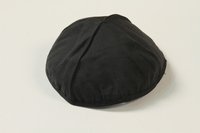
Black yarmulke used by a German Jewish refugee
Object
Black yarmulke owned by Peter Victor who lived as a Jewish refugee from Berlin in Shanghai, China, from 1938-1947. A yarmulke is a skullcap worn by observant Jewish males. Peter, age 18, left to escape the anti-Jewish policies of the Nazi-led government. His parents, Carl and Elsa, arrived in Shanghai in 1939. Carl died in 1940 and Elsa in 1942. Shanghai was liberated by the United States Army on September 3, 1945. With the aid of the American Joint Distribution Committee, Peter emigrated to America in December 1947.
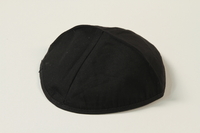
Black yarmulke used by a German Jewish refugee
Object
Black yarmulke owned by Peter Victor who lived as a Jewish refugee from Berlin in Shanghai, China, from 1938-1947. A yarmulke is a skullcap worn by observant Jewish males. Peter, age 18, left to escape the anti-Jewish policies of the Nazi-led government. His parents, Carl and Elsa, arrived in Shanghai in 1939. Carl died in 1940 and Elsa in 1942. Shanghai was liberated by the United States Army on September 3, 1945. With the aid of the American Joint Distribution Committee, Peter emigrated to America in December 1947.
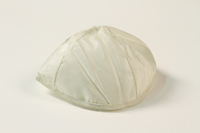
White satin yarmulke owned by a German Jewish refugee
Object
White satin yarmulke owned by Peter Victor who lived as a Jewish refugee from Berlin to Shanghai, China, from 1938-1947. A yarmulke is a skullcap worn by observant Jewish males. Peter, age 18, left to escape the anti-Jewish policies of the Nazi-led government in 1938. His parents, Carl and Elsa, arrived in Shanghai in 1939. Carl died in 1940 and Elsa in 1942. Shanghai was liberated by the United States Army on September 3, 1945. With the aid of the American Joint Distribution Committee, Peter emigrated to America in December 1947.
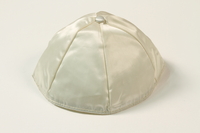
White satin yarmulke with a button owned by a German Jewish refugee
Object
White satin yarmulke with a button owned by Peter Victor who lived as a Jewish refugee from Berlin to Shanghai, China, from 1938-1947. A yarmulke is a skullcap worn by observant Jewish males. Peter, age 18, left to escape the anti-Jewish policies of the Nazi-led government in 1938. His parents, Carl and Elsa, arrived in Shanghai in 1939. Carl died in 1940 and Elsa in 1942. Shanghai was liberated by the United States Army on September 3, 1945. With the aid of the American Joint Distribution Committee, Peter emigrated to America in December 1947.
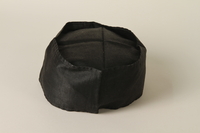
Black cloth cap owned by a German Jewish refugee
Object
Black cloth collapsible cap that belonged to Peter Victor, who lived as a Jewish refugee from Berlin to Shanghai, China, from 1938-1947. Peter, age 18, left to escape the anti-Jewish policies of the Nazi-led government in 1938. His parents, Carl and Elsa, arrived in Shanghai in 1939. Carl died in 1940 and Elsa in 1942. Shanghai was liberated by the United States Army on September 3, 1945. With the aid of the American Joint Distribution Committee, Peter emigrated to America in December 1947.
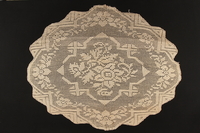
Crocheted tablecloth and replacement thread saved by a German Jewish refugee
Object
Crocheted tablecloth and loosely wound extra rayon thread that belonged to Peter Victor, who lived as a Jewish refugee from Berlin to Shanghai, China, from 1938-1947. The collection includes the pattern for the tablecloth: 2004.524.15. Peter, age 18, left Germany to escape the anti-Jewish policies of the Nazi-led government in 1938. His parents, Carl and Elsa, arrived in Shanghai in 1939. Carl died in 1940 and Elsa in 1942. Shanghai was liberated by the United States Army on September 3, 1945. With the aid of the American Joint Distribution Committee, Peter emigrated to America in December 1947.
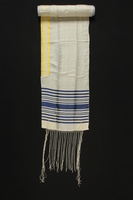
Blue striped tallit with an embroidered neckband owned by a German Jewish refugee
Object
Contemporary blue striped tallit acquired by Peter Victor after his emigration to the United States in 1947. A tallit is a prayer shawl worn by Jewish men during morning services. The atarah [neckband] of this tallit is embroidered with the prayer recited while donning the shawl. Peter, age 18, left Berlin, Germany, for Shanghai, China, in 1938 to escape the anti-Jewish policies of the Nazi-led government. His parents, Carl and Elsa, arrived in Shanghai in 1939. Carl died in 1940 and Elsa in 1942. Shanghai was liberated by the United States Army on September 3, 1945. With the aid of the American Joint Distribution Committee, Peter emigrated to America in December 1947.
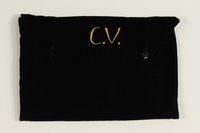
Blue velvet tallit pouch with an embroidered monogram owned by a German Jewish refugee
Object
Navy blue velvet tallit bag that belonged to Peter Victor, who lived as a Jewish refugee from Berlin in Shanghai, China, from 1938-1947. The pouch originally belonged to his father, Carl Victor, whose initials are embroidered on one side. The bag was used to store a tallit, a prayer shawl worn by Jewish males for morning services. Peter, age 18, left Germany to escape the anti-Jewish policies of the Nazi-led government in 1938. His parents, Carl and Elsa, arrived in Shanghai in 1939. Carl died of tropical disease on Novmber 29, 1940, and Elsa on May 9, 1942. Shanghai was liberated by the United States Army on September 3, 1945. With the aid of the American Joint Distribution Committee, Peter emigrated to America in December 1947.
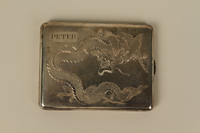
Engraved silver cigarette case with box owned by a German Jewish refugee
Object
Engraved silver cigarette case and purple box acquired by Peter Victor in Shanghai, China, where he lived as a Jewish refugee from 1938-1947. It has an engraved inscription. Peter, age 18, left Berlin for Shanghai in 1938 to escape the anti-Jewish policies of the Nazi-led government. His parents, Carl and Elsa, arrived in Shanghai in 1939. Carl died in 1940 and Elsa in 1942. Shanghai was liberated by the United States Army on September 3, 1945. With the aid of the American Joint Distribution Committee, Peter emigrated to America in December 1947.
Green wool blanket acquired by a German Jewish refugee
Object
Green wool US Army blanket given to Peter Victor in Shanghai, China, by US troops who liberated the city in 1945. Peter, age 18, had left Berlin, Germany, in 1938 to escape the anti-Jewish policies of the Nazi-led government. His parents, Carl and Elsa, arrived in Shanghai in 1939. Carl died in 1940 and Elsa in 1942. Shanghai was liberated by the United States Army on September 3, 1945. With the aid of the American Joint Distribution Committee, Peter emigrated to America in December 1947.
Crocheted tablecloth pattern in 4 pieces saved by a German Jewish refugee
Object
Tablecloth pattern separated into 4 sections that belonged to Peter Victor, who lived as a Jewish refugee from Berlin to Shanghai, China, from 1938-1947. The collection includes the pattern for the tablecloth: 2004.524.15, which was made in Berlin and brought by Peter or his parents to Shanghai. Peter, age 18, left Germany to escape the anti-Jewish policies of the Nazi-led government in 1938. His parents, Carl and Elsa, arrived in Shanghai in 1939. Carl died in 1940 and Elsa in 1942. Shanghai was liberated by the United States Army on September 3, 1945. With the aid of the American Joint Distribution Committee, Peter emigrated to America in December 1947.



